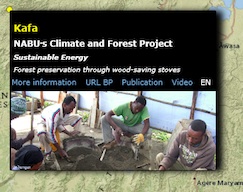Forest preservation through wood-saving stoves.
 NABU, in cooperation with the Ethiopian Government and other partners, started a project to protect the last natural forests in the birthplace of Coffea arabica. In the last 10 years, almost 43% of these forests have disappeared, as they have been transformed into arable land. This is causing a huge loss of biodiversity and the emission of greenhouse gases.
NABU, in cooperation with the Ethiopian Government and other partners, started a project to protect the last natural forests in the birthplace of Coffea arabica. In the last 10 years, almost 43% of these forests have disappeared, as they have been transformed into arable land. This is causing a huge loss of biodiversity and the emission of greenhouse gases.
Ethiopia currently caters for 96 percent of its energy requirement using biomass. Due to this fact many households satisfy their demand by cutting trees form the available natural forests/woodlands and shrub lands. This situation has been cited as one of the driving forces for deforestation. Similar to other parts of the country people of Kafa mainly use wood products for fire. The firewood comes from the nearby forests. On top of that, the biomass fuel is mostly used inefficiently. This has a direct relationship with the household income and time budget. The more inefficiently the wood is used the more time women and children will spend on firewood collection. The dependency on biomass energy in one part, cultivation on the other hand accelerated deforestation and created negative influence on endemic/indigenous biodiversity, large quantities of carbon dioxide have also been released and the carbon-storage capacity of the forest has been markedly reduced.
The target of this project is to introduce energy-saving stoves to the communities in Kafa Biosphere Reserve and distribute 10,000 of them to households with high wood consumption. The new technique of these stoves not only reduces the amount of wood needed for cooking by half, it also saves the forests, time for the user and produces less smoke and fire. The stoves are therefore a source of great relief to the people and the forest and have been received very well.
To produce and distribute the stoves NABU is working closely with the Kafa Zone Department for Water, Mines and Energy. As part of this cooperation 50 young unemployed people were trained as stove producers and supported to start their production business. Today they produce up to 30 stoves per day and get requests from other local people who are convinced of the stoves’ advantages and want to purchase them for their own household.
NABU project link
Related links:
- UNESCO pages
- For life, for the future. Biosphere reserves and climate change (pdf)
A collection of good practice case studies - Kafa Biosphere Reserve website
- Nabu website















